
Alexander Aleksandrovich Alekhine was a Russian and French chess player and the fourth World Chess Champion, a title he held for two reigns.
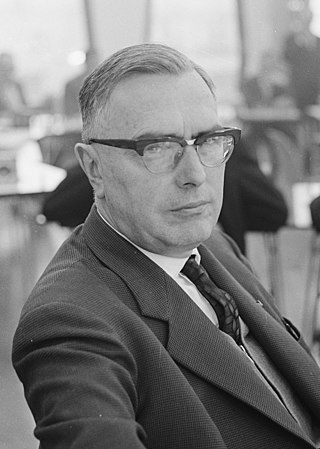
Machgielis "Max" Euwe was a Dutch chess player, mathematician, author, and chess administrator. He was the fifth player to become World Chess Champion, a title he held from 1935 until 1937. He served as President of FIDE, the World Chess Federation, from 1970 to 1978.

The World Chess Championship is played to determine the world champion in chess. The current world champion is Gukesh Dommaraju, who defeated the previous champion Ding Liren in the 2024 World Chess Championship.

José Raúl Capablanca y Graupera was a Cuban chess player who was the third world chess champion from 1921 to 1927. A chess prodigy, he is widely renowned for his exceptional endgame skill and speed of play.
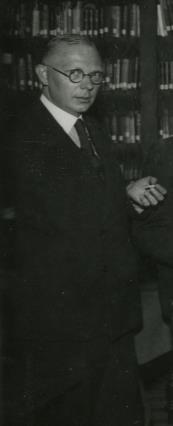
Johann "Hans" Joseph Kmoch was an Austrian-Dutch-American chess International Master (1950), International Arbiter (1951), and a chess journalist and author, for which he is best known.

Reuben C. Fine was an American chess player, psychologist, university professor, and author of many books on both chess and psychology. He was one of the strongest chess players in the world from the mid-1930s until his retirement from chess in 1951. He was granted the title of International Grandmaster by FIDE in 1950, when titles were introduced.

Akiba Kiwelowicz Rubinstein was a Polish chess player. He is considered to have been one of the greatest players never to have become World Chess Champion. Rubinstein was granted the title International Grandmaster in 1950, at its inauguration.

Dawid Markelowicz Janowski was a Polish chess player. Several opening variations are named after Janowski.
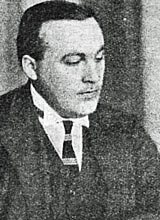
Efim Bogoljubow, also known as Efim Dimitrijewitsch Bogoljubow, was a Russian-born German chess grandmaster.
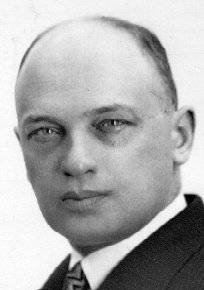
Savielly Tartakower was a Polish chess player. He was awarded the title of International Grandmaster in its inaugural year, 1950. Tartakower was also a leading chess journalist and author of the 1920s and 1930s and is noted for his many witticisms.

Richard Selig Réti was an Austro-Hungarian, later Czechoslovak, chess player, chess author, and composer of endgame studies.
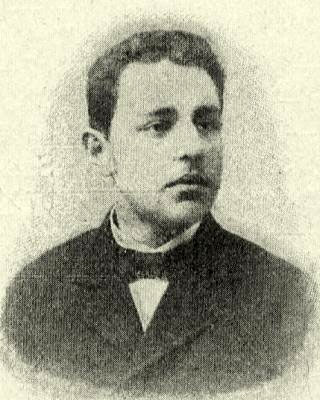
Ossip Samoilovich Bernstein was a French chess player and businessman. He was one of the inaugural recipients of the title International Grandmaster from FIDE in 1950.
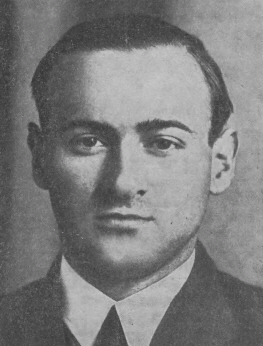
Friedrich Sämisch was a German chess player and chess theorist. He was among the inaugural recipients of the title International Grandmaster from FIDE in 1950.
The Hastings International Chess Congress is an annual chess tournament which takes place in Hastings, England, around the turn of the year. The main event is the Hastings Premier tournament, which was traditionally a 10 to 16 player round-robin tournament. In 2004/05 the tournament was played in the knock out format; while in 2005/06 and 2006/07 it was played using the Swiss system. Alongside the main event there is the challengers section, which is open to all players. The winner of the challengers event earns an invitation in the following year's Premier.

The 1921 World Chess Championship was played between José Raúl Capablanca and Emanuel Lasker. It was played in Capablanca's native Havana from March 18 to April 28. Capablanca won the match by a score of 9-5 to become the third World Chess Champion.
The St. Petersburg 1914 chess tournament was one of the most famous chess tournaments of the early twentieth century. It included almost all the leading players of the time, and was won by World Champion Emanuel Lasker, who came from behind to narrowly defeat future World Champion José Raúl Capablanca. Another future World Champion, Alexander Alekhine, finished third, ahead of the former World Championship contenders Siegbert Tarrasch and Frank Marshall.
The Carlsbad 1929 chess tournament was one of four well-known international chess tournaments held in the spa city of Carlsbad. The other tournament years were 1907, 1911 and 1923.
Zurich 1934 was an international chess tournament held in Zurich from 14 to 29 July 1934 to commemorate the 125th anniversary of Schachgesellschaft Zürich. Alexander Alekhine won, followed by Max Euwe and Salo Flohr tied for second-third. The tournament also served as the 1934 Swiss Championship, won by Hans Johner as the highest-ranking Swiss player.













